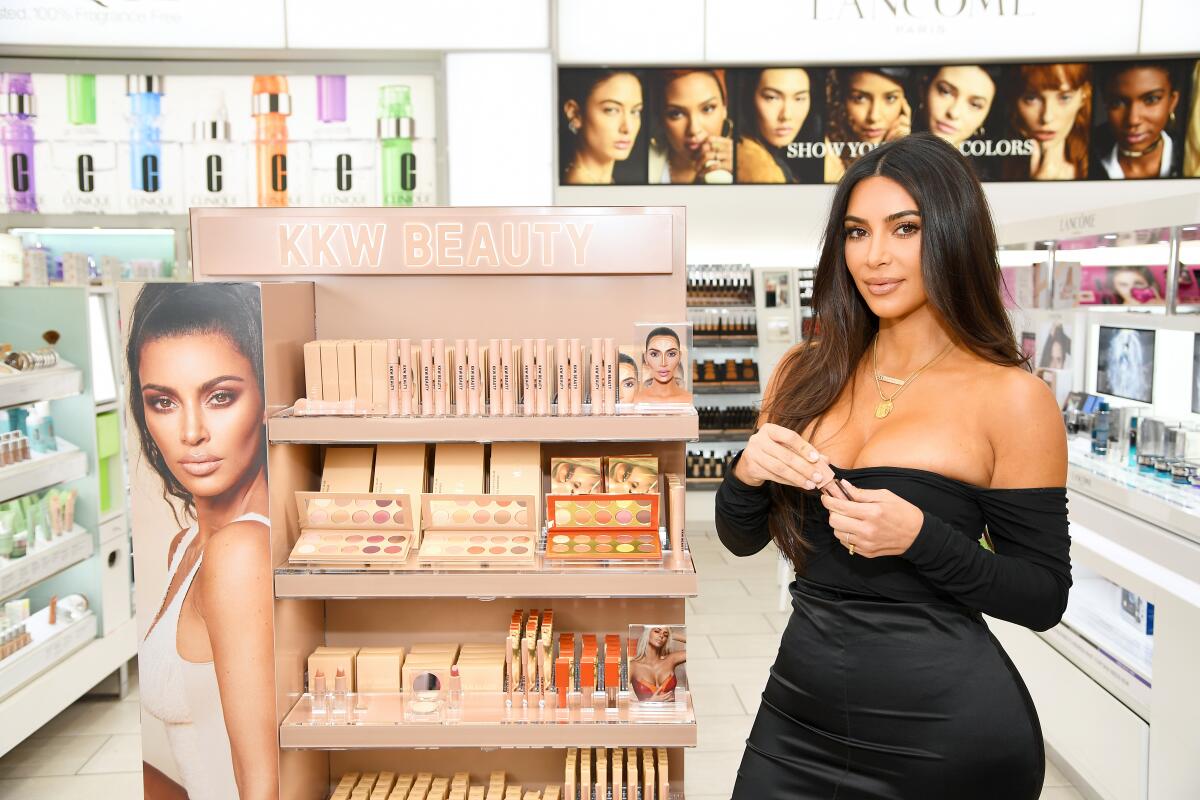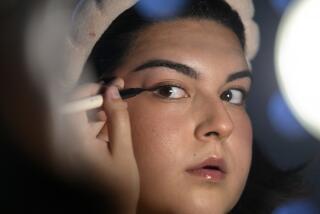Kim Kardashian enters China’s influencer world — just in time for the country’s shopping frenzy

BEIJING — Twelve million people watched as Kim Kardashian West opened a mah-jongg set on screen, displaying the domino-like tiles of the popular Chinese game.
“My friends play all the time,” Kardashian said. “I’m the only one who doesn’t know how to play. ... Now I have to learn.”
The Los Angeles-based reality TV celebrity was speaking on a livestream channel run by Chinese influencer Viya, a spunky, bright-eyed woman in her 30s with more than 9 million followers on China’s e-commerce platform Taobao, many of whom are die-hard fans who call themselves “women of Viya.”
Every night, the livestream shopper hawks cosmetics, purses, apparel and snacks online, speed-talking and showcasing everything from Gucci purses to Chinese spice packages for sour fish soup.
This is what’s known in China as “social commerce,” a full fusion of social media and online shopping. In China’s online ecosystem, where e-payments, livestreaming and e-commerce are fully integrated — as if Amazon, Instagram and Paypal all existed on one platform — influencers such as Kardashian have become a major driver of consumption.
That drive is ramping up as Nov. 11, China’s “Singles’ Day” and the largest shopping day of the year, approaches. It raked in more than $30 billion on that day last year on Alibaba’s two online platforms, Taobao and Tmall, alone. That’s five times the online sales for Black Friday in the United States last year.
This year, Chinese sales are expected to increase, despite the Chinese economy’s slowing growth rate, inflated pork and other food prices, and the impacts of the U.S.-China trade war. But as Kardashian’s appearance demonstrates, American products — and celebrities — still have cachet here despite heightened tariffs and geopolitical tension.
One consulting company found in a survey this year that 78% of respondents thought their consumption of U.S. brands would be affected by the trade war. More than half of them said “national loyalty” would be their main reason for not buying American brands. But it seems unlikely that such patriotic consumption habits will materialize into a broader boycott of U.S. brands during Singles’ Day, analysts said.
“Typically, they will say something patriotic or nationalistic,” Shaun Rein, business analyst and founder of the China Market Research Group, said of the Chinese survey respondents. “But when it comes to actually buying something, they don’t care about that so much. They care more about quality, price, and value.”
Tmall Global, an online shopping platform owned by Alibaba, the internet giant that also owns Taobao and Alipay, announced Wednesday that it plans to recruit and train 2,000 influencers in a “Global Influencer Ecosystem” to sell international goods to Chinese consumers. It already has 500 recruits from 10 countries, Kardashian included.
There is a trend of rising Chinese preference for Chinese goods, Rein said, particularly in consumer electronics, where Huawei mobile phones have taken over Apple’s market share in China. But patriotism still isn’t as important as getting a good deal when it comes to consumer decisions, he said.
“If the product is not comparable quality, they won’t boycott. It’s just like people still want to buy Canada Goose, because there’s nothing comparable in China,” he said, referring to the Canadian parka brand.
In a show of nationalism similar to the criticisms levied against Houston Rockets general manager Daryl Morey and the NBA for his comments supporting Hong Kong last month, Chinese social media users had posted calls to boycott Canada Goose after Huawei executive Meng Wanzhou was arrested in Canada last year.
But when mainland China’s first Canada Goose store opened in Beijing the same month, shoppers lined up out the door, waiting for more than an hour in freezing temperatures to buy the $1,300 down jackets.
Chinese consumers are still big fans of U.S. products. Nike shoes and Supreme tees fill the streets of Beijing (though many are fakes). Coach bags and Tesla cars are status symbols for Chinese consumers, who account for a third of spending on luxury products worldwide.
And celebrities are still eager to sell to the Chinese, despite the potential restrictions of political censorship. Rihanna is marketing her makeup brand Fenty Beauty on TMall Global. Taylor Swift is headlining the countdown gala for Singles’ Day next week.
Like much of life in China, online shopping is a cutthroat competition. On Viya’s channel, you can only buy the products she advertises in limited-quantity waves. You grab a coupon first, wait for her to countdown, then click. But click fast: If you miss it, they sell out.
Sometimes Viya begs the producer to release just a few thousand more pieces of the product, available for just a few seconds. She ramps up the psychological pressure. The clicks come flying in.
Meanwhile, you watch Viya demonstrate everything she sells. She dabs lipstick on her wrist. She chugs a fiber supplement drink. She steams buns in an oven, fires up a vacuum cleaner, wipes off makeup, slurps a bowl of noodles; she can go for six hours at a time without missing a breath.
At her peak last month, she sold $49.7 million of goods in one day.
Kardashian appeared on Viya’s livestream Thursday to promote her signature KKW fragrances, packaged in bottles shaped like full red or hot pink lips.
“Very sexy,” Viya said, wiggling one bottle in front of the screen.
She sold 150,000 bottles of the perfume in a matter of seconds, according to an Alibaba report.
The two influencers bantered, with Kardashian calling in from abroad on a screen within Viya’s screen. Viya asked about Kardashian’s favorite Chinese food. Kardashian said her sister Khloe was trying to learn how to make dumplings.
Viya said she’d sent Kardashian a gift: a mah-jongg set embossed with Tmall Global’s logo.
“Next time you come to China, we can have hot pot and play mah-jongg together,” Viya said through an interpreter.
“I would love it,” Kardashian smiled.
More to Read
Sign up for Essential California
The most important California stories and recommendations in your inbox every morning.
You may occasionally receive promotional content from the Los Angeles Times.











